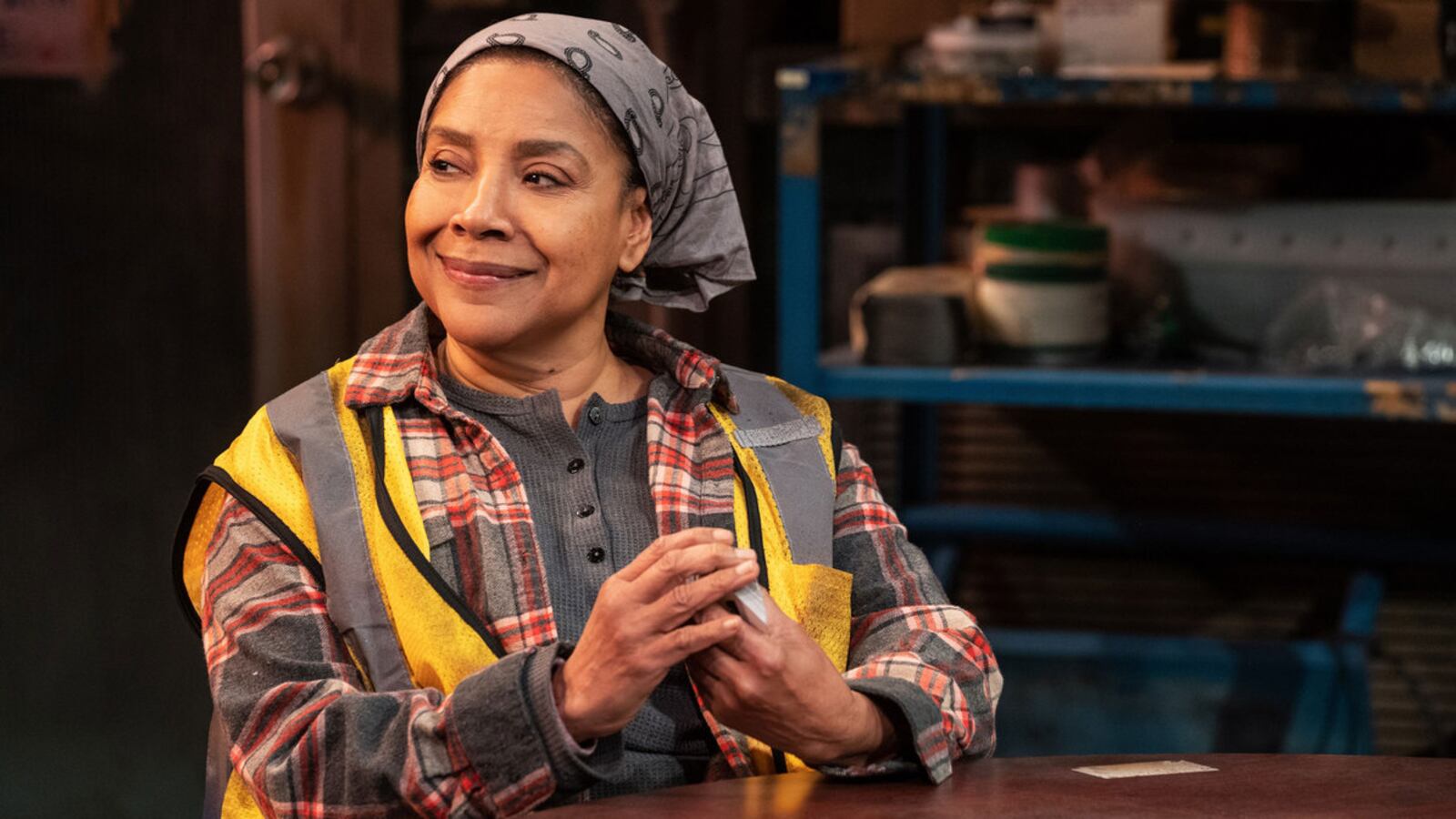In the break room of a Detroit stamping plant, around 2008, somebody may be stealing Shanita’s (Chanté Adams) salad dressing. Dez (Joshua Boone) flirts with her, but his grating leering gains an extra edge when we see that he owns—Chekhov alert!—a gun.
The third character in Dominique Morisseau’s Skeleton Crew—which opens at the Samuel J. Friedman Theatre tonight, booking to July 22—is Reggie (Brandon J. Dirden), the foreman of the plant, apparently addicted to putting up signs telling the workers what to do, and how to behave. The most visible notice advises against smoking, and it's aimed at one employee in particular, her name underlined: Faye (Phylicia Rashad), the group‘s den mother who in her own estimation is “irreplaceable” when it comes to the running of the plant.
Tony winner Rashad’s performance in this Manhattan Theatre Club production is pristine, sharp, deeply felt, caustic, and warm. Faye is a bullshit-destroyer on contact, and Rashad immediately imbues her with such depth of personality—rigid bearing, direct eye contact with whoever she speaks with—she has created one of the most distinctive and engaging characters on the Broadway stage this winter.
Inside the Playbill for the play, Morisseau writes movingly about how her father, Frantz Morisseau, inspired the play. He died in February 2020, and while researching his obituary, Morisseau alighted on an article he had written for the Worker’s League for Michigan, headlined “Workers Are the Power in this Country.”
“As I soon began reading, I felt adrenaline rush through me,” Morriseau writes. “It was a revelation that I am absolutely this man’s daughter. Though we weren’t always of the exact same mind, his revolutionary mentality and advocacy for the impoverished, the colonized and the working class has always been where we are forever aligned.” Morisseau dedicates the play “to my number one advocate in life. My rep. My first line of defense. And the man who taught me the power of standing up for working people.”
Morisseau says she could not have written Skeleton Crew without her father, and this may explain the flintiness, anger, wit, and empathy that rise up in contrasting waves through its two-hour path, directed with sensitivity and energy by Tony-winning Ruben Santiago-Hudson.
All the characters are strong and insist on owning space both inside the breakroom and far outside it. Shanita is pregnant, excellent at her job, and determined to build a future for herself. Dez is not just out for himself, and not just placing himself unwelcomingly in Shanita’s way. He wants to open a repair shop, before he—and the rest of the jobs are “swatted” by management.

Phylicia Rashad (Faye) and Brandon J. Dirden (Reggie) in “Skeleton Crew.”
Matthew MurphyReggie is not just an annoyingly petty rule-follower. He is tasked with trying to find out who may be stealing parts, and is also tasked with management’s bidding to fire workers, but who will he choose? And Faye is not just a confident, not-to-be-screwed-with den mother. She is a lesbian, the fact of which is introduced thus to us via her comment to Dez: “I know how to get a girl in the back of my car faster than you. Tell you that much.” Morisseau’s comedy is as sharp as the play’s more serious focus on loyalty, love, and survival. Faye tells Dez his car is nothing but an “ol’ Betsie… Engine sound like it’s gonna die on you any day now. Like an ol’ dirty woman with an emphysema cough.”
Everything of life is in the break room. Beats of humor and seriousness flow animatedly within the group, and between scenes Adesola Osakalumi dances in silhouette, as Nicholas Hussong’s projections of urban Detroit fill the stage. The spirit of a city is distilled in both the characters and staging. Whether it’s smacking Dez down or giving Shanita support, or sharing tenderness—but why?—with Reggie, Faye is the leader of this group, and her strength is admired by everybody. But soon we realize how vulnerable she is, and how ashamed she is to be perceived as weak or in need.
Everyone on stage has a swagger, and everyone is hiding something: Dez’s feelings for Shanita are deeper than maybe even he realizes, and the same goes for Shanita, and Reggie must deal with what seems like Dez breaking workplace rules. Faye, as the workers’ rep and also Reggie’s close friend, tries to tread a fine line, which Dez isn’t buying. Rashad plays her as self-contained, always one eye on avoiding detection, or anyone’s help or care. More than once she says she is a survivor, she’s had to be one. “If it’s one thing I know, it’s how to rise the hell up.” Dez doesn’t want to just meekly accept whatever fate has in store in the factory: “I’m gettin’ what’s mine.”
Through all these characters, Morisseau, per her tribute to her father, is channeling a multitude of thoughts and feelings about the labor market, personal responsibility, collective action and loyalty, the world of work, and identity. She writes that years before, when Skeleton Crew was at a fraught stage creatively, she called her father to say that people didn’t seem to understand where it was going.
“And he said to me, ‘I read all your plays and I never know where you’re going. But you always get somewhere good. Tell them to leave you alone, you know what you’re doing.”
The sign not to smoke for Faye is not just a joke, because she sneaks secret smoking sessions—she’s been extremely sick, and Reggie is determined that she does not make herself sicker still. Their relationship is one of the most beautiful in the play for reasons this review will not spoil, but its progress and culmination is not only an exquisite piece of writing about the meaning of family but—as acted by Dirden and Rashad—one of those all-too-rare moments in the theater where an entire auditorium stills to pin-drop silence as two performers cup a moment of profound emotion commandingly in their hands. It’s a beautiful moment of shared love, defined and expressed in its truest terms.
Skeleton Crew doesn’t end there, and oddly Faye isn’t physically present for its conclusion. But spiritually she remains center stage, and this critic could have spent many more hours with her. Morisseau’s dad was right: She knew what she was doing, and definitely got somewhere good.







